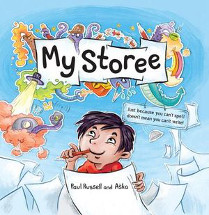My Storee by Paul Russell and Aska

EK Books, 2018. ISBN 9781925335774
(Age: 5-8) When he is at home the stories running through his head
keep him awake at night - stories about dragons and rainbow eggs at
the bottom of Grandma's garden; his teacher being eaten by a
gruesome ogre; unicorn detectives chasing robotic pirates up alien
volcanoes. The wonderful, magical ideas just keep flowing and he
writes and writes and writes. It's all about the adventures and not
about the writing rules.
But at school, the adventures dry up because the writing rules rule.
And the red pen is everywhere,
"But at school their are too many riting rulz and with all the rulz
I can never find my dragons."
At school he doesn't like to write
Until a new teacher comes - one who is a storyteller himself and
knows writing is about the story and not the rules.
In the 80s I was lucky enough to be deeply involved in the process
writing movement where we truly believed that writing had to be
about the ideas and the adventures and that the processes of
reviewing, editing and publishing came later once there was
something to work with. Children were just happy to express
themselves and as teachers, it was our job to guide them with
spelling, punctuation and grammar, semantics and syntax, so that if
one of their ideas grabbed them enough that they wanted to take it
through to publication then we would work together to do that. Words
were provided as they were needed in context, and punctuation and
grammar tackled on an individual's needs rather than
one-size-fits-all lessons. And if the effort of writing was enough
and the child wasn't interested in taking it further, then we had to
accept that - flogging a dead horse was a waste of time. In
pre-computer days, how many nights did I spend on the typewriter
with the big font so a child could have the joy of their own
creation in our class library? Children enjoyed writing for
writing's sake, were free and willing to let their imaginations roam
free and were prepared to take risks with language conventions for
the sake of the story.
But when publicity-seeking politicians whose only experience with
the classroom was their own decades previously declared that
"assessment processes need to be more rigorous, more standardised
and more professional" (a quote from "Teacher") we find ourselves
back to the red pen being king and our future storytellers silenced
through fear. While the teachers' notes tag this book as being about
a dyslexic child, it really is about all children as they learn how
to control their squiggles and regiment them into acceptable
combinations so they make sense to others, a developmental process
that evolves as they read and write rather than having a particular
issue that is easy and quick to label and therefore blame. We need
to accept what they offer us as they make this journey and if they
never quite reach the destination, or are, indeed, dyslexic, then as
well-known dyslexic Jackie French says, "That's what spellcheck and
other people are for." So much better to appreciate their effort
than never have the pleasure of their stories.
So many children will relate to this story - those whose mums have
"to wade through a papar ocean to wake [them] up" - and will
continue to keep writing regardless of adults who think they know
better. But who among those adults will have the conviction and the
courage to be like Mr Watson? Who among the powers-that-be will let
them do what they know works best? If the red pen kills their
creativity now, where will the storytellers and imaginative
problem-solvers of the future come from?
Barbara Braxton